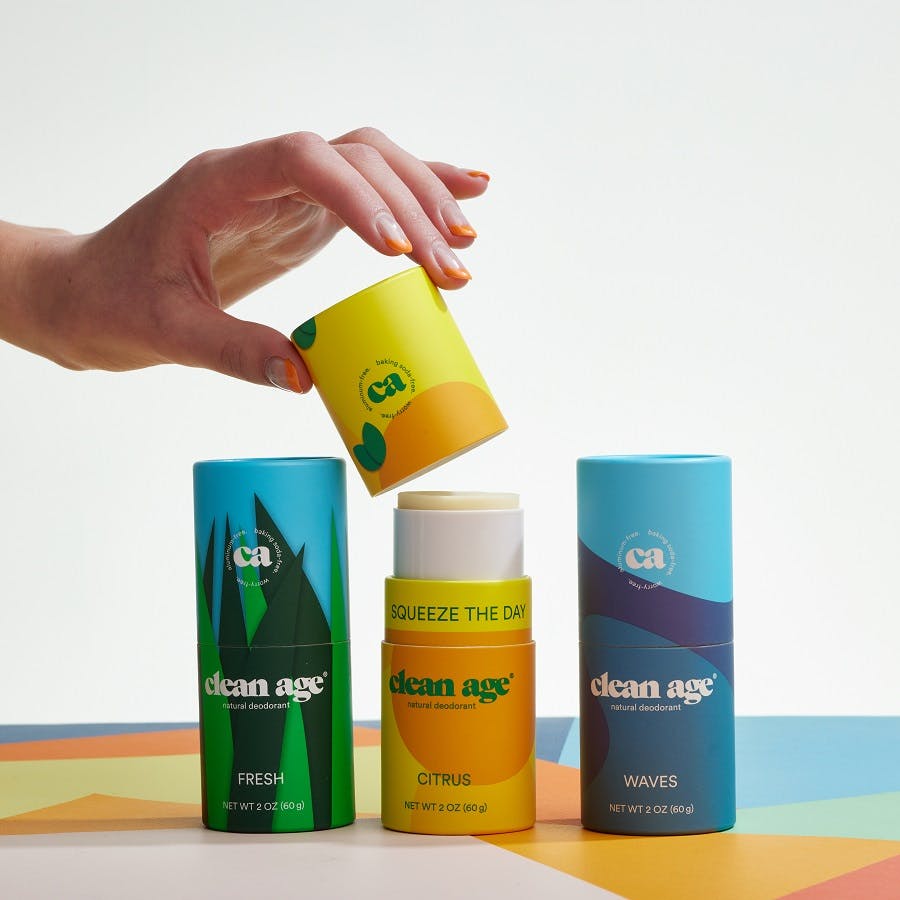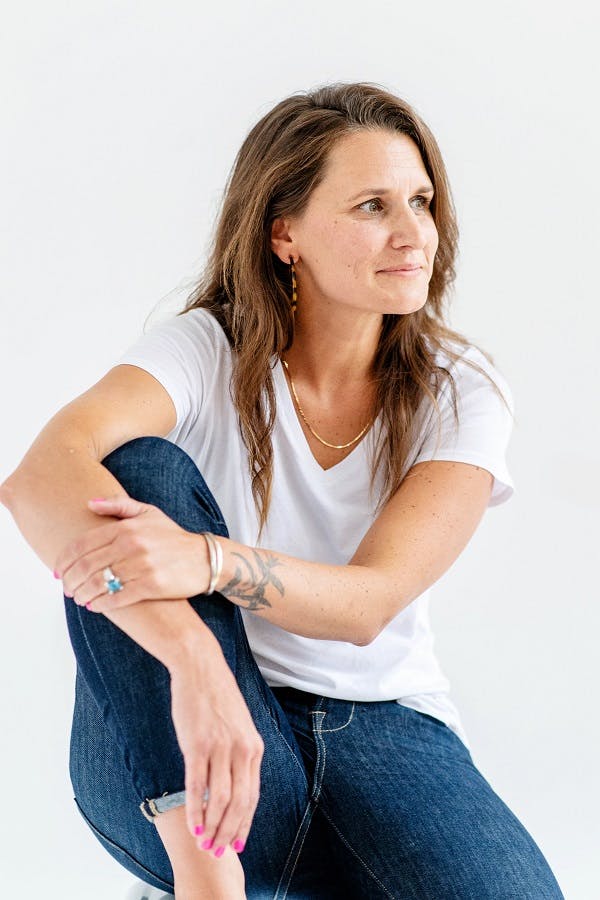Clean Age is batting a thousand when it comes to landing major retail deals. The brand, which makes personal care products aimed at the teenage market, is on the shelves at Fred Meyer thanks to Kroger’s 2021 Natural & Organic Innovation Summit; it also scored a coveted golden ticket from Walmart’s 2022 Open Call; and this past month launched nationwide at RITE AID from the retailer’s 2022 Sustainability Summit.
Each of these opportunities began with a submission on RangeMe and — in the case of Kroger and Rite Aid — included a virtual meeting on ECRM Connect. Three at-bats, three home runs.
I spoke with Clean Age Co-Founder & CEO Rachel Peters and VP of Sales and Operations Brady DeLong to uncover the secret behind their consistent success with these retailers, and by the time we wrapped up, it was clear why they did so well. First, the brand has amazing products made with natural, clean ingredients and sustainable packaging. The products are also gender-neutral, which aligns with the brand’s strong focus on inclusivity. What’s more, the company speaks well to the younger generation of consumers, a coveted market for any retailer.
On the B2B side, the Clean Age team is extremely retailer-focused: Everything they do is from the point of view of delivering value to the buyer, the category and the stores. They also have a clear plan for moving products from the store shelves and into shoppers’ baskets, and they communicate this plan and are very transparent in their dealings with buyers. And as if this wasn’t enough, the Clean Age team members are simply just great people with a ton of passion, who truly believe in their products and serving their customers.
Addressing the teen market
The idea for Clean Age was born out of Co-Founder and CEO Rachel Peters’ experience with her own two children. As they approached their teens and started taking charge of their own personal care, she took them to a mass retail store to let them pick out some products for themselves. However, she realized that none of the products really appealed to them, and a lightbulb went off in her head. “It occurred to me that no one was paying attention to this large segment of consumers who have disposable income and influence on the buying power of their household,” she said.
Peters teamed up with chemists and packaging designers to launch Clean Age, starting with four SKUs of natural deodorants, then expanding into oral care with toothpaste and toothbrushes and also hand sanitizer. And there are more products to come – Peters envisions Clean Age providing any essential product a teen might need during the course of their day.

In addition to providing personal care, Clean Age products are made with Gen Z values in mind. “Sure there are things that are table stakes, such as being sustainable and cruelty free,” says Peters. “But we also added in a layer of evolving needs. For example, all of our products are gender-neutral, which both retailers and members of Gen Z really like because it gives flexibility on the shelves and at home. And we have better-for-you ingredients, which is important because especially at those ages what you are putting on your body really matters. We look long and hard at every ingredient we put into the products. And of course, they are designed to really stand out on the shelves.”
This also means that the products can be promoted throughout the year, according to Peters. Their better-for-you aspects are important at the beginning of the year when everyone is focusing on health and wellness; as a woman-owned company, the brand can be promoted during Women’s History Month; Earth Day promotions can address the sustainability aspects of the brand; Pride Month promotions can focus on the gender-neutral aspects of the products; and finally, they are ideal for back-to-school promotions aimed at teens.
Leading with empathy
When I asked Peters what it was about their RangeMe profile and ECRM meeting pitches that she felt led to their success, her answer was so simple yet amazingly profound: “You have to lead with empathy,” she says. “Put yourself in the buyer’s shoes. They are sorting through thousands of submissions and products and profiles and they have sales goals that they have to meet. So we really try with our RangeMe profile to make it easy for buyers to understand that we know what we are doing, and that we meet all of their standards so that it’s not going to be a problem when it comes to inputting the products on their system. We also use great photography and have done our homework on the products’ price points and how they translate to retail.”
‘Put yourself in the buyers shoes.’
Rachel Peters, Co-Founder & CEO, Clean Age
When it comes to buyer meetings, they try to relate as people when pitching, being respectful of the buyers’ time, and understanding their goals, objectives, and any challenges they can help the retailer address. “We try to be very understanding and cooperative,” she says. “One of the advantages of being an emerging brand is that we can listen to you as the retailer and can react or change based on the feedback they provide – for example, adjusting our packaging or branding so that it’s better on their shelf. We really try to collaborate with retailers to help them meet their goals.”
The order is just the beginning
Getting an order from the retailer is just the beginning, however, once that happens, it’s all about execution: getting the products onto the retailer’s shelves and into shoppers’ baskets. And that’s where Brady DeLong, VP of Sales and Operations comes in.
“It becomes a question of how to operationalize it,” says DeLong. “Can you get the product where it needs to go? Can you scale operations? Can you scale production and inventory? Then it’s all about moving it off the shelf.”
To say that his arrival on the scene was a baptism by fire would be a bit of an understatement. Just days after starting at Clean Age, they learned that Rite Aid decided to go nationwide with their deodorant instead of at just a couple of hundred stores as originally planned.
With such quick growth, the scaling of the company’s operations had been one of the biggest challenges, though DeLong knows that having strong forecasting capabilities and regular communication with retail partners is the key to successful execution. After all, he previously worked for a food and beverage brand where orders came in every few weeks. He leverages Katana manufacturing resource planning software to help keep track of it all.
“We’re able to put together a really good forecast, manage the raw materials coming in, as well as all of the production dates to make sure that we’re keeping stuff fresh, and are not over- or under-producing,” says DeLong. “Now that we have it all set up, we have a good cadence rolling with great partners and great people. While it’s a huge challenge, it’s also been a lot of fun and a really cool collaborative effort for everyone on the Clean Age team to jump in and assist with.”
This collaborative problem-solving mentality permeates through every part of the company and extends to its retailer partners as well. If there is a request they can’t deliver in exactly the way the retailer needs, for example, they will always come back with a solution that would meet the same needs, but perhaps in a different way. Oftentimes, they settle on a solution that works for everyone.


Supporting the retailer’s sales efforts
Most buyers not only want to know about how unique a supplier’s product is, they also want to know how that supplier will support it with promotions and marketing that will drive traffic to the stores and drive consumer sales. The team at Clean Age has many tricks up its sleeve to take care of this.
One area they will be exploring is digital coupons aimed at consumers in local markets. Working with technology vendor Sampoll, the program essentially targets consumers with an offer for a discounted or sample product from a local participating retailer. They are sent a link to a landing page on which they fill out a simple form with demographic questions and questions about their intent for the product and what they typically purchase. Once they buy the product, they upload the receipt into the platform to get reimbursed.
The beauty of a program like this is that it drives shoppers into the stores and captures valuable information about them that the brand owns. “It’s definitely not a cheap approach by any means,” says DeLong. “You need to have the budget and the resources allocated to support it, and you need to be very strategic because you don’t want to do it everywhere. But you can leverage that data to help improve other aspects of your business.”
Clean Age will also be leveraging influencers to help drive traffic to its retailer partners via an ambassador program. “We’ll have our influencers go into the stores, mention them by name, and talk about how great their local Rite Aid or Fred Meyer is, for example. We’ll have them pick up our product from the shelf and talk about their experience with it. For us, programs like these are putting our money where our mouth is; if we say we are retail-first, then we have to have all the attention go back to the retailers and not to us.”
Peters and DeLong are also working on creating some unique in-store experiences to engage shoppers around their personal care products and are looking to build a team to support more in-store activations.
Addressing teens’ mental health
Since the Clean Age demo consists primarily of teens, the brand seeks to support issues that are important for this group, and has taken a two-pronged approach to address a cause that’s very close to this consumer segment: mental health.
The first is via the packaging on its own products. The side of its toothpaste packaging, for example, features a “two-minute pep talk,” says Peters, as two minutes is the length of time recommended for brushing. “It’s a positive and encouraging sentiment that reminds them of the value and opportunities that lay ahead of them for that day. Under our deodorant caps we also have encouraging sayings.”
They also have partnerships with the Sam Hubbard Foundation, which provides food and basic necessities at schools in Cincinnati for students in need. In addition, Clean Age supports Project 48, an organization that takes care of teens in the foster care system during the first 48 hours after transitioning to a new household, providing them with the basic essentials they will need in the new home. Clean Age contributes toothpaste and deodorant for these programs.
The brand plans to continually seek new and interesting ways to engage its customers as it expands into additional retail chains and adds more products to the lineup, and they are not afraid of thinking out of the box if it will help their retailer partners. “That’s one of the fun parts of being an emerging brand,” says Peters. “You don’t have to play by the rules of the big guys.”

